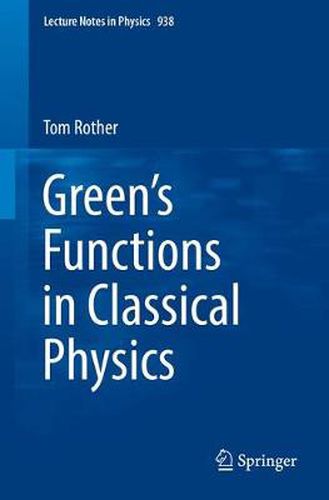Readings Newsletter
Become a Readings Member to make your shopping experience even easier.
Sign in or sign up for free!
You’re not far away from qualifying for FREE standard shipping within Australia
You’ve qualified for FREE standard shipping within Australia
The cart is loading…






This title is printed to order. This book may have been self-published. If so, we cannot guarantee the quality of the content. In the main most books will have gone through the editing process however some may not. We therefore suggest that you be aware of this before ordering this book. If in doubt check either the author or publisher’s details as we are unable to accept any returns unless they are faulty. Please contact us if you have any questions.
This book presents the Green’s function formalism in a basic way and demonstrates its usefulness for applications to several well-known problems in classical physics which are usually solved not by this formalism but other approaches. The book bridges the gap between applications of the Green’s function formalism in quantum physics and classical physics. This book is written as an introduction for graduate students and researchers who want to become more familiar with the Green’s function formalism.
In 1828 George Green has published an essay that was unfortunately sunken into oblivion shortly after its publication. It was rediscovered only after several years by the later Lord Kelvin. But since this time, using Green’s functions for solving partial differential equations in physics has become an important mathematical tool. While the conceptual and epistemological importance of these functions were essentially discovered and discussed in modern physics - especially in quantum field theory and quantum statistics - these aspects are rarely touched in classical physics. In doing it, this book provides an interesting and sometimes new point of view on several aspects and problems in classical physics, like the Kepler motion or the description of certain classical probability experiments in finite event spaces. A short outlook on quantum mechanical problems concludes this book.
$9.00 standard shipping within Australia
FREE standard shipping within Australia for orders over $100.00
Express & International shipping calculated at checkout
This title is printed to order. This book may have been self-published. If so, we cannot guarantee the quality of the content. In the main most books will have gone through the editing process however some may not. We therefore suggest that you be aware of this before ordering this book. If in doubt check either the author or publisher’s details as we are unable to accept any returns unless they are faulty. Please contact us if you have any questions.
This book presents the Green’s function formalism in a basic way and demonstrates its usefulness for applications to several well-known problems in classical physics which are usually solved not by this formalism but other approaches. The book bridges the gap between applications of the Green’s function formalism in quantum physics and classical physics. This book is written as an introduction for graduate students and researchers who want to become more familiar with the Green’s function formalism.
In 1828 George Green has published an essay that was unfortunately sunken into oblivion shortly after its publication. It was rediscovered only after several years by the later Lord Kelvin. But since this time, using Green’s functions for solving partial differential equations in physics has become an important mathematical tool. While the conceptual and epistemological importance of these functions were essentially discovered and discussed in modern physics - especially in quantum field theory and quantum statistics - these aspects are rarely touched in classical physics. In doing it, this book provides an interesting and sometimes new point of view on several aspects and problems in classical physics, like the Kepler motion or the description of certain classical probability experiments in finite event spaces. A short outlook on quantum mechanical problems concludes this book.